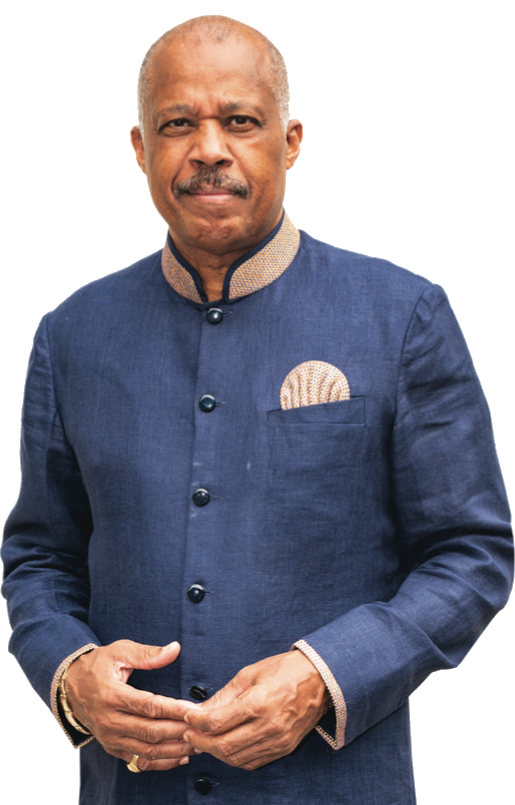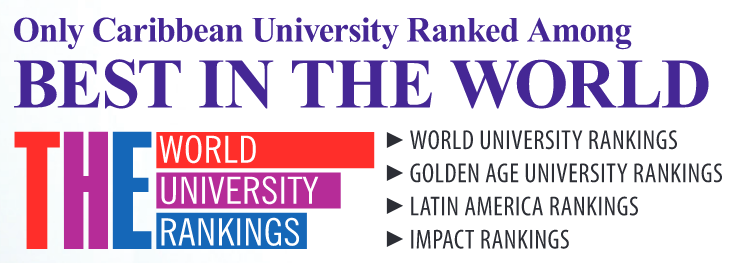
Vice-Chancellor’s OVERVIEW
In 2023 as we present the report on work for the period 2021–2022, The UWI celebrates seven and a half decades of dedicated service to the region. We are proud of our status as a symbol of regional unity, of transformation and activism.

As we look towards our centenary and the next few years, as we engage in the second phase of a forward-looking strategic plan, The UWI re-commits itself to bold visioning of a future for the Caribbean beyond 2030, reaffirming the UWI brand of excellence in service to the region, working with our partners to develop strategies for achieving our collective development goals in a post-pandemic world, and to preparing and providing the leadership as well as supporting the leaders of the region for the forward thrust that is required.
It is my firm belief that the visibility and reputation of The UWI are at an all-time high. However, we continue to reflect on our journey to this point and to look to the future, to envision the development trajectory of our communities and our nations. We must imagine the best-case scenarios for our people and determine how best we can collectively achieve that future through innovation and greater efficiency.
The Triple A Strategy framework – Access, Alignment and Agility – outlined in our 2017 – 2022 Strategic Plan has underpinned the work of The UWI over these past five years. The period under review represented the final year of this Phase 1 – Reputation Revolution – of our Triple A Strategy.
Back in 2018, we took the bold step of engaging in the Times Higher Education (THE) global rankings as a means of elevating the visibility and appeal of The UWI not only to regional and international students, but also to scholars and institutions wishing to partner with us. In 2021, The UWI surged to the top 1.5% in the global field of 30,000 universities and elite research institutes ranked by THE. This rise was attributed to our strategy of internationalisation, high quality academic delivery, research, service and attentiveness to particular challenges faced by the region we call home. These included climate change, the economic challenges that were exacerbated by the COVID-19 pandemic that unfolded in 2020, addressing chronic non-communicable diseases, and demonstrating our role as an activist university in frontally tackling social and other societal ills.

Another significant part of our Reputation Revolution was the establishment of centres in Africa, China, Europe, Canada, the United Kingdom, the United States of America, and Latin America. These Centres serve as a means of elevating the visibility of The UWI brand among researchers, students and industry collaborators in those locations.
The COVID-19 pandemic declared by the World Health Organisation in March 2020 was a pivotal moment in our history. With agility, The UWI rose to the occasion – even before the pandemic was declared – to share our considerable multi-disciplinary expertise by establishing in January 2020 The UWI COVID-19 Task Force to advise governments and regional organisations in areas such as virology, paediatrics, healthcare management, monitoring strategies, mental health, ethics and counselling, communication and public education. Gender and youth issues also took central place in the work of the task force. With training provided by the Open Campus, in true One-UWI fashion, The UWI was able to continue teaching in emergency remote teaching mode with minimal disruption to our students. The period under review marked the second full year of university operations within imposed restrictions. Throughout 2020 and into 2022, staff, students, alumni and other stakeholders worked together to ensure that our students were able to stay the course and complete their programmes. Two cohorts of students participated in virtual and blended graduation ceremonies in 2021 – testimony to their determination and the support of the entire UWI community. Students also helped with outreach to fellow students and to the wider community. Cave Hill students who worked with the Barbados Defence Force in Operation Seek and Save to conduct surveys in communities across Barbados to ensure that public health interventions were timely, have been hailed as heroes, for their courage and steadfastness.
Across all the major disciplines, including but not limited to medical sciences, support to the region was at its highest, for example, through laboratory testing services, clinical services in the public health sector, statistical COVID surveillance and data modelling which helped guide Caribbean governments’ decision-making around COVID-19 regulations, particularly related to lockdown and reopening, and entry protocols for travellers.
Despite the challenges during this period, I believe it was a magnificent moment for The UWI as, at all levels, we demonstrated our commitment and caring for the societies we serve. Even though the pandemic is not yet fully behind us, The UWI remains focussed on building on the lessons learned and redoubling our efforts to develop and implement strategies for a post-pandemic environment in the region.
Climate change poses a stark and existential threat to the lives and livelihoods of Caribbean people. The leadership and activism of UWI academics has for decades—even before climate change was at In 2021, The UWI surged to the top 1.5% in the global field of 30,000 universities and elite research institutes ranked by THE. the forefront of the global agenda—underpinned the region’s call to the international community and developed countries to face up to these challenges. Our research has informed Intergovernmental Panel on Climate Change (IPCC) reports and consultations at UN Climate Change Conferences (COP) and other fora. The UWI continues to be the lead university on climate change for the International Association of Universities and our academics remain at the forefront of research and advocacy as we maintain the mantra “1.5 to stay alive!”, even though there are hints of worrisome backsliding.
Reflecting The UWI’s leadership role in climate change, the virtual UWI-wide Global Institute for Climate Smart and Resilient Development (GICSRD) was established in 2021 to consolidate The UWI’s teaching and research on climate change, disaster risk reduction and mitigation, and resilience and capacity building. Another important initiative is the establishment of a Centre for the Blue Economy at the Five Islands Campus in Antigua and Barbuda which will strengthen institutional and regional capacity in the areas of marine science and the blue economy.
These initiatives were facilitated through significant partnerships that I believe reflect The UWI’s heightened visibility and reputation at the global level. GICSRD was established with assistance from partners that included the Open Society Foundations, the Clara Lionel Foundation, and the UNDP. The Centre for the Blue Economy was established with the full support of the Government of Antigua and Barbuda.

Other significant partnerships include the Gordon Butch Stewart International School of Hospitality and Tourism, a joint venture between The UWI, Sandals Resorts International and Florida International University. It is headquartered at Mona’s Western Jamaica Campus and will integrate teaching from all other campuses in a OneUWI approach. The School will provide training for the regional hospitality sector which remains a major part of the region’s economic thrust.
The UWI, with the support of the governments of CARICOM, has led the reparatory justice movement in the Caribbean which has inspired a global response from governments and individuals that has been most encouraging. The UWI was identified as the conduit through which reparation is to be made to the region by descendants of slave owners in two instances. A contribution of US$500,000 was committed to The UWI’s Global Giving Campaign for scholarships for students by Bridget Freeman, whose ancestors had connections to Barbados. In a similar move, the Trevelyan family, who had connections in Grenada, recently made an initial commitment of £100,000 towards establishing an education fund for The UWI Open Campus, with details of the fund to be determined by the Grenada National Reparations Commission in collaboration with The UWI and the Government of Grenada.
Another important reparatory initiative which in 2019 saw the birth of the historic Glasgow-Caribbean Centre for Development Research in collaboration with the University of Glasgow, advanced significantly in the period under review. The Centre began its work in three key areas: the public health crisis in the Caribbean, in particular the chronic non-communicable diseases; the search for innovative and progressive post-plantation economic development policies; and facilitating closer cultural ties between Africa and the Caribbean.
As we move forward in the second phase of the Triple A Strategy, 2022–2027, the emphasis will be on a Revenue Revolution. Restoring the University’s financial health is our top priority. We acknowledge that without the firm and sustainable contributions of our people and our governments in the financing of this enterprise, we would not be here today. We anticipate their continued support but are fully seized of the need to diversify our sources of income if we are to reduce dependency on government subventions, and move towards improved budgets for our future sustainability.
The Principals have been exemplary in their embrace of an entrepreneurial UWI ethos and the projects upon which they have embarked are not only income-generating but also address national and regional needs.
Each campus has articulated plans for significant projects such as St. Augustine’s Global School of Medicine, which has the potential to attract international students, and rejuvenating the cocoa sector with potential for fine chocolate production in Trinidad and Tobago. The Cave Hill Campus is meeting a critical health need with a project on-stream to market a line of wellness and nutritional products that emanated from the Campus’ diabetes reversal study.
Other exciting projects include the proposal by the Mona Campus for a housing development on lands to be vested in The UWI by the Government of Jamaica, the Five Islands build-out of a campus that will meet future needs of the OECS countries with attentiveness to the particular needs of those countries and a significant UWI-wide project – the UWI Global Campus. The transformation of the Open Campus to the UWI Global Campus is underway and has significant implications for how we deliver our content to the world, how The UWI-wide system collaborates to deliver that content, and all of this will be underpinned by the institutional digital transformation process that has begun with assistance from the Caribbean Development Bank. It will require all hands on deck to accomplish this important project and I believe that we are ready to make this happen.
The moral and ethical leadership demonstrated at all levels of our One-UWI system is deeply appreciated. The Council, the Executive Management Team, the Campus Senior Management Teams, our students, academics, administrative and technical staff, support staff and all our contractors and providers, have been magnificent in their unswerving support. The past few years have tested our collective mettle, but, in the spirit of our 75th Anniversary theme, we are Rooted in this region that we serve, we stand Ready to confront the challenges that lie ahead, and to ensure that our beloved UWI is ever Rising in the hearts and minds of all who support and stand with us.
We remain focused on achieving our Revenue Revolution and, using the strategy of our Triple A Plan, the collective leadership will continue to keep “The Light Rising from the West!”
Blessings!

Professor Sir Hilary Beckles,
Vice-Chancellor, The University of the West Indies
In this section
OPERATION REVENUE REVOLUTION 75+
New Operation RR75+ Funding Model
CLOSING BUDGETARY GAPS THROUGH NEW ENTREPRENEURIAL PROJECTS
CAMPUS ENTREPRENEURIAL TARGETS
The Entrepreneurial University: Campuses taking on Bankable Projects
REDUCTION IN GOVERNMENT DEBT OWING TO THE UWI 2010-2021
EXPENDITURE REDUCTION / CONTAINMENT
GOLD AWARD FOR BRANDING AND MARKETING
SUCCESS MARKER: SOARING IN THE RANKINGS
QCLASSROOM: STUDENTS AS PARTNERS IN LEARNING
ACCESS THROUGH UWITV CABLE TV PLATFORM



